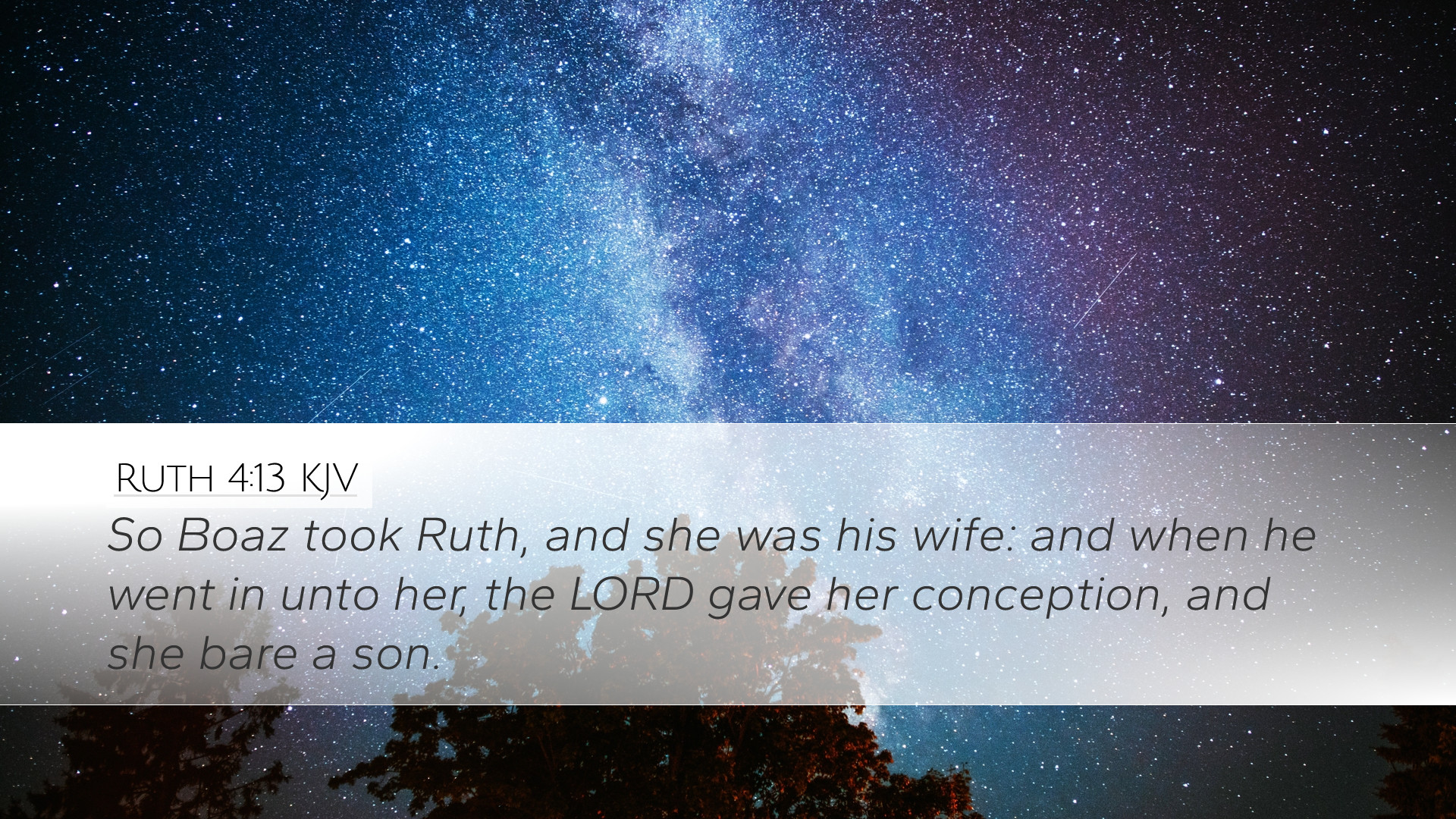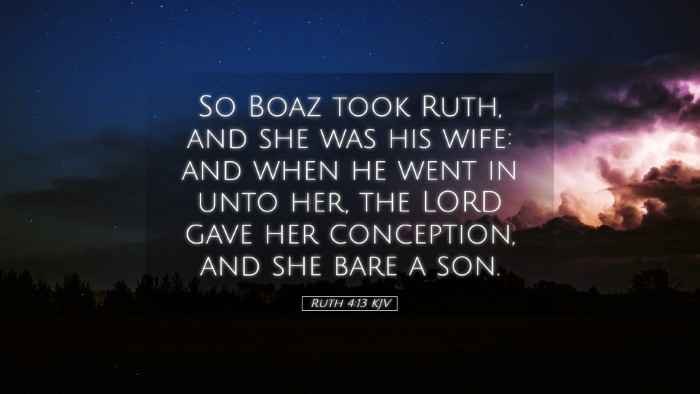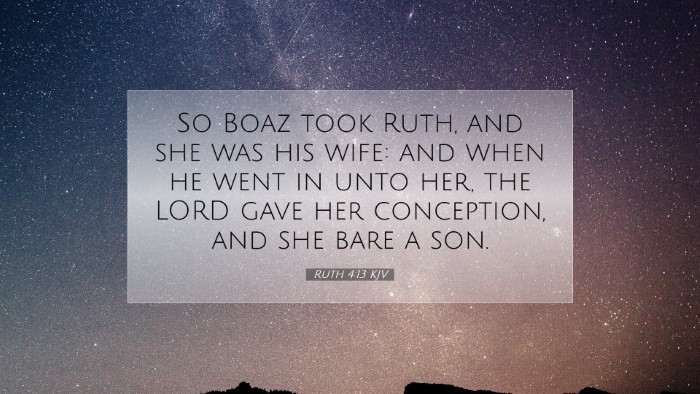Old Testament
Genesis Exodus Leviticus Numbers Deuteronomy Joshua Judges Ruth 1 Samuel 2 Samuel 1 Kings 2 Kings 1 Chronicles 2 Chronicles Ezra Nehemiah Esther Job Psalms Proverbs Ecclesiastes Song of Solomon Isaiah Jeremiah Lamentations Ezekiel Daniel Hosea Joel Amos Obadiah Jonah Micah Nahum Habakkuk Zephaniah Haggai Zechariah MalachiRuth 4:13
Ruth 4:13 KJV
So Boaz took Ruth, and she was his wife: and when he went in unto her, the LORD gave her conception, and she bare a son.
Ruth 4:13 Bible Commentary
Commentary on Ruth 4:13
Verse Context: Ruth 4:13 states, "So Boaz took Ruth, and she was his wife: and when he went in unto her, the Lord gave her conception, and she bare a son." This pivotal moment underscores the themes of redemption, divine providence, and the blessing of family.
Introduction
This passage is the culmination of the narrative arc of the Book of Ruth. The marriage of Boaz and Ruth not only signifies personal redemption for both characters but also highlights God's overarching plan for His people. This commentary synthesizes insights from various public domain sources, particularly from Matthew Henry, Albert Barnes, and Adam Clarke, to explore the theological, historical, and moral implications of this verse.
Commentary Insights
1. The Significance of Boaz's Actions
Matthew Henry emphasizes that Boaz acts as a kinsman-redeemer, fulfilling the Levirate marriage obligation (Deuteronomy 25:5-10). Not only does he marry Ruth, but his actions also restore her family's inheritance. Henry notes that this act restores both Naomi's lineage and hope, illustrating God's redemptive purpose for His people.
2. Divine Providence in Family Life
Albert Barnes points out that the Lord's involvement in Ruth's conception highlights the divine blessing upon their union. This signifies that marriage, when aligned with God's will, is blessed. Ruth's barrenness in her previous marriage and the subsequent divine intervention serve to remind readers that God is in control of life and fertility. Barnes notes that this child represents not only the continuation of the family line but also God's faithfulness to His promises, a theme prevalent throughout the Scriptures.
3. Theological Implications of Conception
Adam Clarke elaborates that the mention of the Lord giving conception emphasizes God's sovereignty in the creation of life. Clarke suggests that this act is a direct interplay between divine will and human agency. The conception of Obed, their son, symbolizes hope and renewal—not just for Ruth and Boaz but also for Israel. It signifies that God does not abandon His people in times of despair.
4. The Symbolism of Names
The name Obed means "servant," as noted by theologians like Henry. This is not merely a descriptor but a profound symbol in the Biblical narrative. The child carries the lineage that leads to David, emphasizing the importance of obedience to God. The genealogical significance of Obed is crucial as it links to the lineage of Christ, highlighting the redemptive narrative threaded throughout Scripture.
5. Redemption and Restoration
The marriage of Boaz and Ruth culminates in a powerful message of redemption. Henry reflects on the theme of restoration that permeates the text. Ruth, a Moabite widow, once an outsider, is fully integrated into Israel through marriage and childbirth. This act of redemption speaks volumes about God's acceptance, breaking down barriers of ethnicity and social status.
6. The Role of Community
Furthermore, the surrounding community's acknowledgment in the previous verses adds richness to the understanding of God's work through Boaz and Ruth. Barnes observes that the elders’ blessing underscores the importance of community in God's redemptive plan. It emphasizes that God's blessings often manifest in relationships and community support, reinforcing the idea that God works through us in familial and communal bonds.
7. Hope for the Marginalized
The story of Ruth is especially pertinent for those who find themselves marginalized or in desperate situations. Clarke notes that Ruth's journey from a foreign land to becoming an essential part of Israel's history exemplifies hope for the outcast. This commentary sheds light on how Ruth's faithfulness and loyalty led her to a place of honor and significance within God's plan.
8. Lessons for Today
For pastors and theologians, Rut 4:13 serves as an encouragement to remain steadfast in faithfulness, highlighting God's ability to bring forth blessings from unlikely circumstances. Henry encourages readers to see God's redemptive work in their lives as a promise of hope. The narrative encourages faithfulness in relationships, trust in God's providence, and active participation in His redemptive work.
9. Practical Applications
In practical terms, Ruth 4:13 inspires believers to:
- Embrace Redemption: Recognize and accept the redemptive work God is doing in our lives.
- Honor Commitments: Commit to loyalty and covenant relationships as exemplified by Ruth and Boaz.
- Trust in God’s Sovereignty: Develop faith in God's control over matters of life, family, and community.
- Support Community: Engage actively in the community, recognizing its role in our journeys.
- Share Hope: Encourage those around us who may feel marginalized, reminding them of God's love and acceptance.
Conclusion
The conclusion of the Book of Ruth in chapter 4, particularly verse 13, encapsulates the essence of God's redemptive love through the marriage of Ruth and Boaz. The insights drawn from Matthew Henry, Albert Barnes, and Adam Clarke enrich our understanding of this passage, prompting readers to reflect on God’s sovereignty, the importance of community, and the transformative power of loyalty and faithfulness.
As we dissect this verse, we are encouraged to recognize that, like Ruth, we too are part of a larger story woven into the tapestry of God's Kingdom. May we find hope, purpose, and encouragement in understanding the providential hand of God at work in our familial bonds and community connections.


